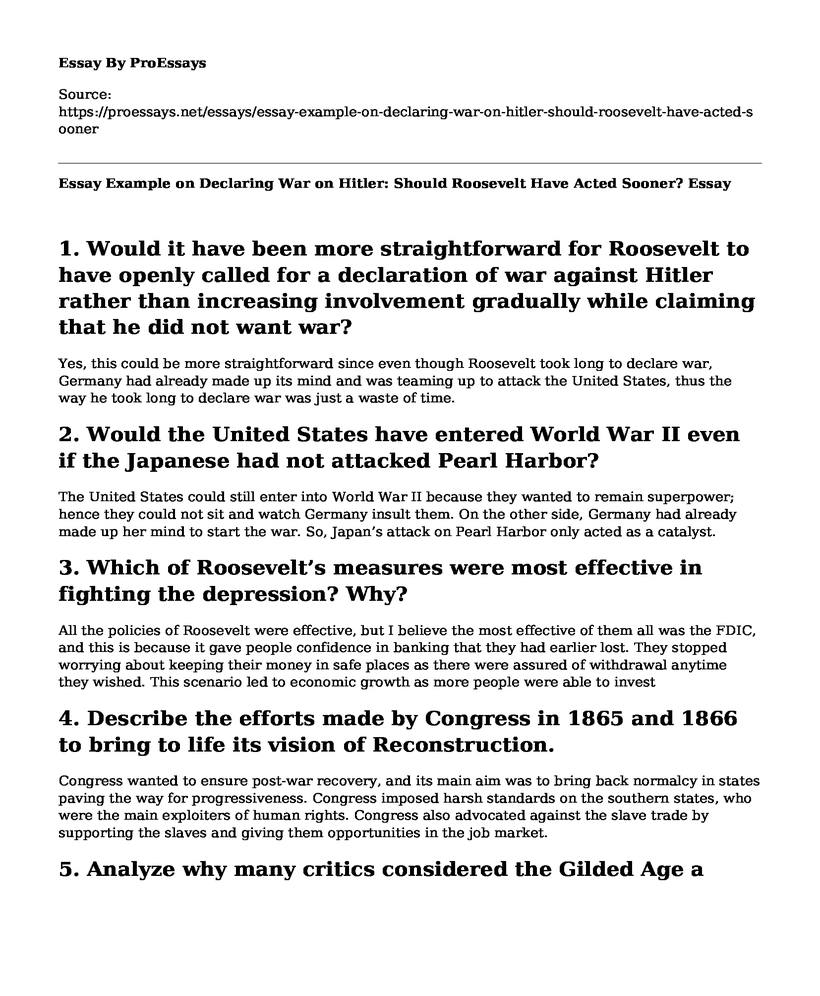1. Would it have been more straightforward for Roosevelt to have openly called for a declaration of war against Hitler rather than increasing involvement gradually while claiming that he did not want war?
Yes, this could be more straightforward since even though Roosevelt took long to declare war, Germany had already made up its mind and was teaming up to attack the United States, thus the way he took long to declare war was just a waste of time.
2. Would the United States have entered World War II even if the Japanese had not attacked Pearl Harbor?
The United States could still enter into World War II because they wanted to remain superpower; hence they could not sit and watch Germany insult them. On the other side, Germany had already made up her mind to start the war. So, Japan’s attack on Pearl Harbor only acted as a catalyst.
3. Which of Roosevelt’s measures were most effective in fighting the depression? Why?
All the policies of Roosevelt were effective, but I believe the most effective of them all was the FDIC, and this is because it gave people confidence in banking that they had earlier lost. They stopped worrying about keeping their money in safe places as there were assured of withdrawal anytime they wished. This scenario led to economic growth as more people were able to invest
4. Describe the efforts made by Congress in 1865 and 1866 to bring to life its vision of Reconstruction.
Congress wanted to ensure post-war recovery, and its main aim was to bring back normalcy in states paving the way for progressiveness. Congress imposed harsh standards on the southern states, who were the main exploiters of human rights. Congress also advocated against the slave trade by supporting the slaves and giving them opportunities in the job market.
5. Analyze why many critics considered the Gilded Age a period of ineffective national leadership?
Critics considered this age to be ineffective because many vices took place, corruption increased rapidly, oppression of women, and racism was on the rise. The African Americans were being discriminated in most aspects, and these led to stagnation of the economy
6. Explain Ronald Reagan’s attitude towards government.
Reagan believed that the government policies were exploitative, and that is why his main aim was to stimulate the sagging economy by lowering taxes across all socio-economic groups. He hated the big government by citing its social efforts as problems instead of solutions.
7. Explain the challenges that African Americans faced during the Great Depression.
Unemployment was the main challenge faced by African Americans during the great depression. The whites felt that they were better than the African Americans, and any available job belonged to them. In the northern cities, the whites conspired to fire to African Americans so that they could own the jobs. Secondly, by the beginning of 932, racial violence was on the rise, African Americans were discriminated against and judged based on their color. The few African Americans who were employed in cotton farms were paid fewer wages too.
8. Identify the key challenges that Americans faced due to urbanization, as well as some of the possible solutions to those challenges.
The main challenges faced by the Americans due to urbanization were congestion. It is because many people moved to urban centers to look for better services. The overcrowding led to the outbreak of diseases such as cholera, yellow fever, and the rise in criminal cases. Poverty also became a major concern as well as pollution from industries.
Civic organizations and churches provided the main solution by focusing on the well-being of people rather than focusing on the preaching of the gospel. Later they focused on helping the needy in the society by providing food and other essential services. The secular sphere relief of 1980 either worked towards the provision of better housing, especially to the slum dwellers.
9. Explain how the inventions of the late nineteenth century contributed directly to industrial growth in America.
The inventions in the 19th century contributed directly to industrial growth in America by increasing the levels of production as, in most cases, the machines that replaced human labor were faster. This ensured the cost of production went down, therefore maximizing profit.
10. Identify specific examples of grassroots Progressivism relating to the spread of democracy, efficiency in government, and social justice.
In the effort to promote the spread of democracy, the progressives’ advocated for direct primary in elections, made many election innovations, and advocated for the 17th amendment of the United States Constitution. In promoting efficiency in government, they fought against corruption by setting clear guidelines. Finally, in social justice, the progressives fought for social equality, especially on the African Americans who had been discriminated against before. They provided essential services to the needy in the society.
Cite this page
Essay Example on Declaring War on Hitler: Should Roosevelt Have Acted Sooner?. (2023, Aug 29). Retrieved from https://proessays.net/essays/essay-example-on-declaring-war-on-hitler-should-roosevelt-have-acted-sooner
If you are the original author of this essay and no longer wish to have it published on the ProEssays website, please click below to request its removal:
- Paper Example on Immigration Policy Changes Due To the 9/11 Attack
- The Islamic State - Paper Example
- Essay Example on Central America: Peace and Democracy After 1992 Peace Accord
- Tri-Colonial Development: Mercantilism & Indenture Servitude - Essay Sample
- Essay Example on the Maya Collapse: A Dark Chapter in History
- Medea: Complexity of Athenian Life - Essay Sample
- French Revolution: People's Dissatisfaction With Leadership - Essay Sample







